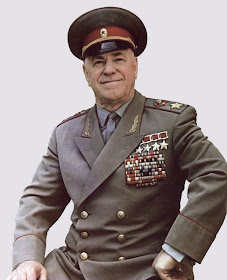Georgi Konstantinovich Zhukov (1896-1974) was the Soviet Union’s most
prominent military leader during World War II. In the 1950s he played a crucial
role in Bolshevik party politics.
Georgi Zhukov was born to a peasant family in Kaluga
Province, where he was apprenticed in the fur trade at the age of eleven. Then,
in 1915, he was conscripted into the Imperial Army, serving well enough to
merit a promotion to the rank of noncommissioned officer. Nevertheless, he was
cautious enough to change sides as soon as the Russian Revolution ended,
entering the Red Army in 1918, and the Communist Party the following year.
A zealous student of military history and tactics, he
distinguished himself during the Russian Civil War (1918- 1920), and continued
to carry out his responsibilities with the same conscientiousness after he was
posted to the Belorussian Military District during the 1920s. Having proved
himself to be an impressive officer, he was sent to the Frunze Military
Academy, from which he graduated in 1931. Thereafter, when sent back to the
Belorussian Military District, he advanced rapidly under the sponsorship of Gen.
Semyon K. Timoshenko, under whom he had served in the civil war. Stalin’s
purges of military leaders in 1937-1938 passed Zhukov by, and he was sent to
the Far East, where he acquitted himself well in border skirmishes with sizable
Japanese forces.
Zhukov’s skill impressed Joseph Stalin, and he was chosen
over several senior generals in early 1941 to become chief of the general
staff. When the Germans invaded the Soviet Union that year, Zhukov quickly
proved his merit, first racing to Leningrad in September to halt the German
threat and then returning to save Moscow from almost certain German capture. He
was promoted to first deputy commander in chief, an office second only to
Stalin’s, then, in 1943 he was named a marshal of the Soviet Union.
It was generally agreed that Zhukov was a difficult leader.
Many of his fellow generals found him arrogant and high-handed, and ruthless
enough to sacrifice thousands of military lives to achieve success. However,
everyone acknowledged that his military feats were astounding. In 1943, with
the success of his armor battle at Kursk, even the German military effort was
blunted. Despite the rivalry of other marshals, notably Ivan Konev, Zhukov kept
the confidence of Stalin, who assigned him the task of seizing Berlin. He
reluctantly summoned assistance from Konev when German resistance stiffened,
but on May 8, 1945, he reached the pinnacle of his military career when he
accepted the German surrender.
The showers of praise that Zhukov received from a grateful
Russian public infuriated Stalin, who swiftly set out to claim all military
victories as his own by cutting the General down to size. Starting in 1946,
Zhukov received a series of demotions culminating in an obscure command in the
Urals Military District.
However, this exile proved to be a relatively short one.
Within 24 hours of Stalin’s death in March 1953, Zhukov began a new political
ascendancy. He was appointed Deputy Minister of Defense, and soon afterward he
took his place as a full member of the Central Committee. Here he earned even
greater prominence, especially after Russians realized that he had been
instrumental in the arrest of Lavrenty Beria, the secret-police chief who was
executed shortly after Stalin’s death in punishment for the thousands of
political executions he had performed.
In 1955 Zhukov became Minister of Defense, and he attended
the summit meeting that year in Geneva. In February 1956, at the Twentieth
Party Congress, Zhukov’s popularity and power were obvious—perhaps too
obvious—and all factions openly courted him. There is considerable reason to
believe that it was his insistence that forced Russian military intervention in
Hungary in November 1956, and it is certain that his support enabled Nikita
Khrushchev to withstand the challenge of the ‘‘antiparty’’ faction of Georgi
Malenkov and Vyacheslav Molotov in 1957.
Once that challenge was met, Zhukov’s power became a matter
of concern to the party leadership. In October 1957, while he was on a goodwill
tour of Albania, he was removed from office and publicly denounced by his own
subordinates and by presumed supporters, for ‘‘anti-Leninist acts.’’ He was
forced to retire, living by turns in a small Moscow apartment and a little
countryside dacha, although the Soviet leadership allowed him an occasional
public appearance, such as at the twentieth anniversary of the Nazi surrender
in May 1965. By this time, however, the tide was beginning to turn in Zhukov’s
favor yet again. Krushchev himself was forced to retire, and now lived in a
little apartment in the same building as Zhukov. So he was not on hand, in
1966, to watch as Zhukov was feted at the 25th anniversary of the victory
against the Germans at Moscow.
It was a great celebration, and he enjoyed it as a fast-aging
man who now spent most of his time writing his memoirs. In 1971, after intense
scrutiny by Party officials, they were published in the West. Just three years
later Zhukov died at age 77, receiving the accolade of a highly complementary
obituary signed by Leonid I. Brezhnev, Aleksei Kosygin and Nikolai Podgorny.
Further Reading
The Memoirs of Marshal Zhukov (1969; trans. 1971) is available. Portions of his
memoirs were published as Marshal Zhukov’s Greatest Battles, edited and
introduced by Harrison E. Salisbury (trans. 1969). Otto Preston Chaney, Jr.,
Zhukov (1971), is an excellent study, and the bibliography is indispensable for
those interested in Soviet military history. A good treatment of Zhukov is the biographical
essay by Seweryn Bialer in George W. Simmonds, ed., Soviet Leaders (1967).
Zhukov also figures prominently in Alexander Werth, Russia at War, 1941-45
(1964), and Roman Kolkowicz, The Soviet Military and the Communist Party
(1967). New York Times Biographical Edition (June, 1974).

No comments:
Post a Comment